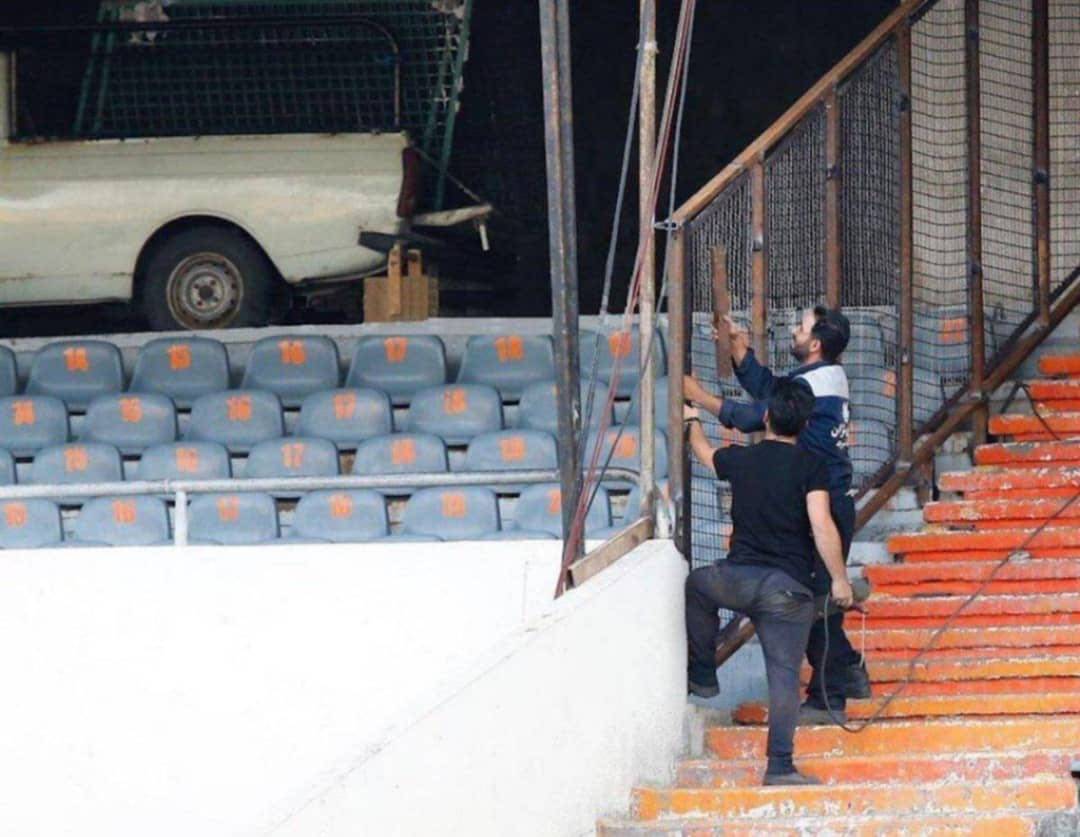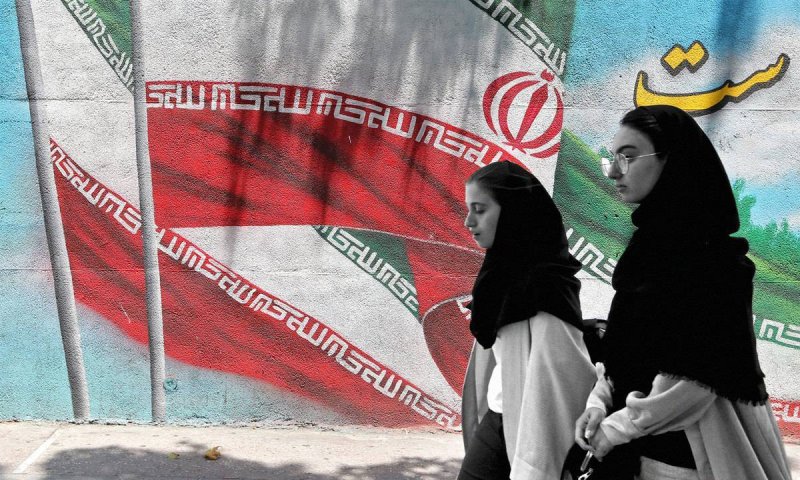On Thursday October 10, Iranian women were able to enter a football stadium for the first time in many decades, after FIFA threatened to suspend Tehran for banning female football fans from entering stadiums nearly 40 years ago, in compliance with clerics’ calls on the necessity of protecting women “from the masculine atmosphere and watching men playing in short shorts”
Observers say that the Azadi stadium in Tehran, which on October 10 hosted the 2022 World Cup qualifiers against Cambodia, had allowed women to enter stadiums to attend political speeches but had forbidden them from attending matches, which means that the regime exploits women when they need them politically.
FIFA ordered Iran in September to allow women unrestricted access to stadiums in numbers determined by the demand for tickets. An Iranian female fan who became known as “the blue girl” died in September after setting herself on fire for fear of being jailed after being arrested by police for disguising herself as a man to watch a sports match.
However, the authorities' permission for women to go to the stadiums cannot be seen as an endorsement by the ruling regime of equality and women's rights. Observers believe that the only reason for this permission is the threat by FIFA to impose sanctions on the state, which international organizations accused of oppressing women.

According to an article published by The Guardian on October 9, Iranian women rushed to get tickets for the match, while Iranian media said that the first batch of tickets were sold in less than an hour and additional seats were improvised in record time. A sports ministry official said the 100,000-person stadium was ready to host more women.
"All countries that rule in the name of religion exploit women, the more they oppress women the more it seems to their supporters that they are religious": Ali Lasheen on the recent decision to allow women in football stadiums in #Iran.
The entry of Iranian women into football stadiums is an exception and will not include their attendance in local matches, but will merely cosmetically improve Iran’s image abroad under pressure from FIFA
Raha Bourbakhsh, one of thousands of women who purchased tickets for the match, said she still can't believe it’s true, throughout her career as a sports journalist focused on football she has only watched matches on television expressing great joy at being able to finally experience a live match.
The Guardian interviewed Iranians on the street who welcomed the move to allow women to attend matches "I want women like men to have freedom to attend matches and tosit next to men freely without any restrictions, like other countries," one Iranian woman said.
Ahead of the 2022 World Cup in Qatar, Iran was under pressure from FIFA to allow women to attend this round of qualifying matches. Iranian law does not ban women in stadiums, but stadiums are strict about letting women in.
Since the 1979 Islamic revolution, women have rarely been allowed to cheer in stadiums, once twenty Irish women participated in the World Cup qualifiers Iran Ireland in 2001, and four years later, tens of Iranian women were allowed to watch a match in Bahrain.
Sources in Iran told Raseef22 that on the morning of October 9, the authorities began erecting barriers to separate men and women not only inside the stadium but also in its parking lots, where men’s and women's car spaces were separated.
Activists say the Iranian regime is sending indirect messages to conservatives inside the country that it is against women entering the stadiums. The regime has allowed demonstrations against the decision to allow women to enter stadiums. The most recent demonstration was on October 8 in which 50 Iranian women protested in front of the parliament carrying banners saying that they are against women entering the stadiums. Activists believe that these protests have been staged by the regime itself as unlike other protests it has not been prohibited or stopped.
On social media, an Iranian man wrote a comment on this type of protest: “Aren’t they ashamed of this kind of protest, certain parties of known affiliations are allowed to protest about the right of women to enter stadiums, but workers are not allowed to protest about not receiving their salaries because their protests are not legal? How can the constitution accept this distinction?”
Oppressing Women In The Name of God
Researcher Ali Lasheen, an Iran specialist told Raseef22 that the Iranian regime has exploited women over the past years because they are the only social group through which it can send a message that it respects and defends Islam. The government has oppressed women and imposed a dress code and obligatory hijab on them and forbid them from attending matches even though Iranian players wear shorts longer than that of other players around the world. Preventing women from attending matches is just a “political gesture” as Lasheen describes it.
The researcher stressed that the Iranian women have endured the most within this theocracy that wants to control all the details of life, which is the regime’s justification for preventing women from practicing certain arts on the pretext that they are contrary to religion, including ballet, dance and singing, in addition to entering stadiums- the whole point of which is to depict the regime as the sole protector of Islam.
"All the countries that rule in the name of religion exploit women, the more they oppress women the more it seems to their supporters that they are religious" says Lasheen.
According to Lashin, the Iranian regime, which had to allow women to attend football matches in fear of FIFA sanctions also allowed demonstrations by extremist women to tell its supporters on the one hand, and to the country's conservatives on the other hand, that it was still against this decision and that it was forced to do so to save Iranian football.

Rebellion
Although Iran is extremely restrictive with women, this did not prevent some of women from achieving sporting successes: Iranian boxer Sadaf Khadem became the first female boxer to represent Iran in a match, she won last April against French boxer Anne Chauvin in Rouen, France. However, Iran decided not to recognize this participation, issuing an arrest warrant for her and her coach for defying the Islamic dress code and not wearing a hijab.
Against Compulsory Hijab
Regarding the compulsory hijab, several demonstrations have taken place in recent months, which the regime has cracked down on ruthlessly. Last August an Iranian court sentenced three activists to prison on the grounds that they "did not respect the laws of compulsory hijab" in Iran.
Monireh Arabshahi, Yasmin Eryani and Mojgan Keshavarz were sentenced and detained in Qarchak prison in the Iranian capital, accused of "assembly and collusion to act against national security" and "propaganda against the regime" and "encouraging and preparing the grounds for corruption and prostitution."
According to Amnesty International, the three women were arrested after they posted a video on International Women's Day which showed them walking without veils inside the Tehran Metro and then distributing flowers to passengers.
Iranian women are resisting the compulsory veil by wearing head scarves that don’t cover the head entirely which has been condemned by government media outlets as “bad hijab” while others are holding demonstrations against compulsory hijab that often end in detention.
The entry of Iranian women into football stadiums is an exception and will not include their attendance in local matches, but will merely cosmetically improve Iran’s image abroad under pressure from FIFA. Education and other basic rights, such as allowing women to drive and be in leadership positions, come in the context of clerics' attempt to change the perception of women under Islamic rule in Iran and to present themselves as progressive reformers but the reality is different and is unjust to women, activists in Iran say.
Raseef22 is a not for profit entity. Our focus is on quality journalism. Every contribution to the NasRaseef membership goes directly towards journalism production. We stand independent, not accepting corporate sponsorships, sponsored content or political funding.
Support our mission to keep Raseef22 available to all readers by clicking here!
Interested in writing with us? Check our pitch process here!



